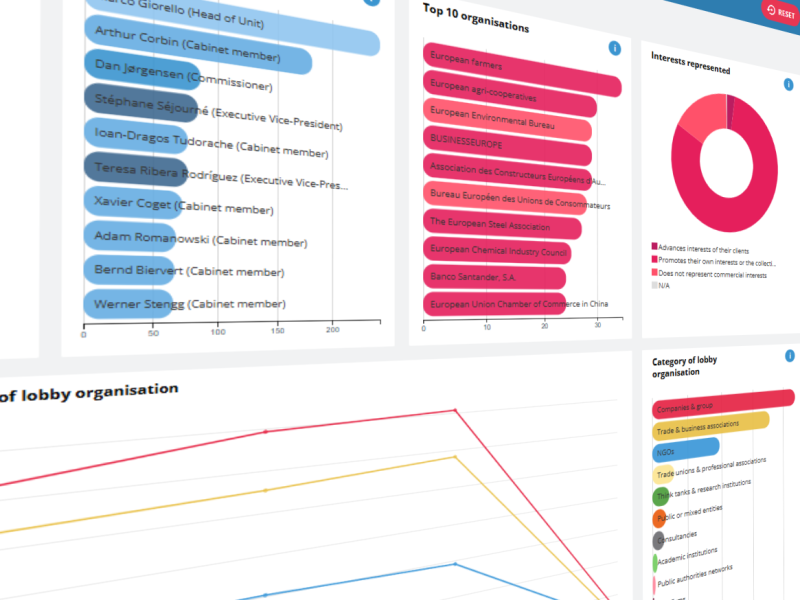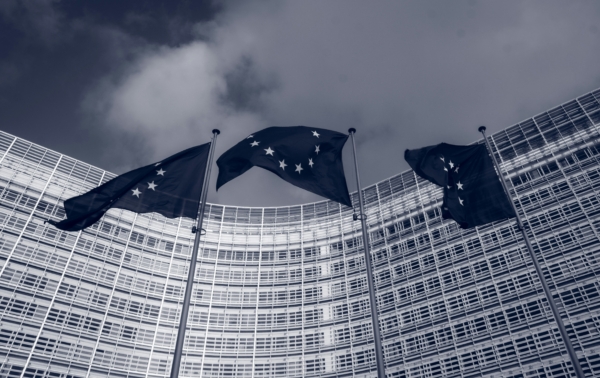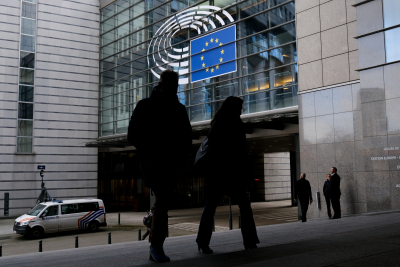Integrity Watch EU received a major update this week. Our platform has provided user-friendly access to data on EU lobbying activities and financial interests since 2014. This new version not only improves overall user experience, but, in a first, also provides automatic daily updates for nearly all available tools. A major addition is the inclusion of Commission lobby meetings held with management-level staff, providing deeper insights into the lobbying dynamics of the nearly 13,000 organisations registered in Brussels.
Following long-standing advocacy by TI EU and partners, the European Commission extended meeting reporting obligations to all management staff in December 2024. Previously, only members of the Commission including Commissioners, Cabinet Members and Directors-General were required to publish their meetings. This means that we’ve gain access to meetings declarations for some 1100 extra officials.
Data released today on Integrity Watch EU shows how much this constitutes a major advance for lobby transparency in the EU. What did we learn? We had a first look in the data to find out.
To date, EU lobby organisations held 5813 meetings since the beginning of the new Commission mandate in December 2024. To put that into perspective, only 2183 meetings were published over a similar period of time during the previous mandate—or more than double the number of meetings published before the rules were changed. This underlines how our previous analyses could only cover the tip of the iceberg, a fact previously highlighted in our report on fossil fuel lobbying .
As we gain more meeting transparency, our understanding of the interests driving the EU grows deeper. The name of the game remains EU climate policy. We found that at least a third of all published meetings have subjects related to the EU’s climate agenda.
In the absence of clearly defined portfolios (the Commission used to categorise meeting topics, but abolished this data point last year), the actual number could be much higher. Simplification and competitiveness top the list of most popular subjects for climate-related meetings, with 421 meetings mentioning one or the other, or both. In contrast, the Green Deal as a subject matter has all but disappeared from the EU’s lobbying landscape, with a mere 21 meetings specifically mentioning the EU’s landmark climate package. The digital policy area also remains a major lobbying target, with 492 meetings mentioning related issues, including DSA enforcement and the AI act.
Things get more interesting when we look at who has been able to snag the most meetings with the European Commission.
The biggest standout is that the top 20 biggest players at the Commission only include three NGOs. Agriculture, automobiles, chemicals, big tech and finance dominate the top ranking, potentially signalling the Commission’s shifting priorities.
Regarding overall NGO access, the new data reinforces a severe imbalance with corporate stakeholders dominating meetings held. In fact, this new Commission held a mere 16% of all meetings with civil society representatives.
The President of the Commission isn’t exactly leading by example here. Since the beginning of her new mandate, she’s published a mere three. Only one of these three was held with an organisation that labels itself an NGO: the World Economic Forum, known for its annual billionaire gathering in Davos. That’s hardly a bona-fide civil society representative.
The laws drafted by the EU affect hundreds of millions of people. It is crucial that their voices are sufficiently heard in the decision-making process. Yet we are in a political landscape that is increasingly seeking to restrict civic space – both in Brussels and at national level.
To be clear, access does not equal legislative impact. Nevertheless, each missed opportunity to interact with a diversity of stakeholders deprives decision-makers of valuable input. And at the other end of the spectrum, a lack of balanced stakeholder access could lead to policy capture, where only to the interests of specific organisations are catered to. It’s time for the Commission to take a stand and send a strong signal. It did the right thing in expanding its meeting declaration obligations, putting its provisions well ahead of its peers when it comes to lobby transparency. It should do the right thing and ensure a balanced approach in meeting all stakeholders.
Please note: Integrity Watch EU provides an overview of organisations’ lobbying footprints. Different organisations can attend the same meeting. As we are seeking to understand access to EU decision-makers, our platform disaggregates meeting data by individual lobbying organisation. The platform is updated daily. Data used for this analysis was retrieved on Monday 8 April.








